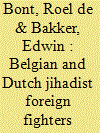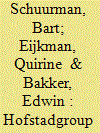| Srl | Item |
| 1 |
ID:
147717


|
|
|
|
|
| Summary/Abstract |
In recent years, Belgium and the Netherlands have been confronted with relatively many citizens or residents who have traveled to Syria and Iraq to join and fight with jihadist groups — 388 Belgian and 220 Dutch as estimated by the respective authorities. This article provides an overview of the phenomenon of jihadist foreign fighters in the Low Countries, analyzing their characteristics, motivations, and roles in the war in Syria and Iraq. It compares the Belgian and Dutch cases, focusing on key aspects, such as age, sex, and geographical and socioeconomic background.
|
|
|
|
|
|
|
|
|
|
|
|
|
|
|
|
| 2 |
ID:
136867


|
|
|
|
|
| Summary/Abstract |
The challenge of violent radicalization is an important part of (the Prevent pillar) of the 2005 EU Counter-terrorism Strategy and is specifically dealt with in the 2005 EU Strategy for Combating Radicalisation and Recruitment to Terrorism. This article assesses the EU counter-radicalization approach by comparing the above mentioned strategies and other policy documents to theoretical notions on radicalization and counter radicalization. It focuses on the comprehensiveness, implementation and consistency of the EU policies that aim to prevent individuals from turning to violence, while halting the emergence of the next generation of terrorists.
|
|
|
|
|
|
|
|
|
|
|
|
|
|
|
|
| 3 |
ID:
142529


|
|
|
|
|
| Summary/Abstract |
Despite the Dutch Hofstadgroup's status in the literature as a prime example of a homegrown Salafi-Jihadist terrorist network, the authors, using newly available primary sources, argue that this classification is to a large extent unwarranted. The lack of a rudimentary organizational structure, the existence of divergent views on the legitimacy and desirability of political violence, and the absence of collective action in pursuit of a violent goal rule out labeling the Hofstadgroup as a terrorist organization or network for the largest part of its 2002–2005 existence. A smaller subgroup of extremists did begin developing into a proto-terrorist inner circle from late 2003 onwards. In 2004, this extremist core brought forth the murderer of filmmaker Theo van Gogh. But it was only in 2005, when the remnants of the inner circle tried to resuscitate the Hofstadgroup in the wake of the arrests that had followed Van Gogh's death, that these individual actions were replaced by the communal efforts necessary to warrant the “jihadist network” label often ascribed to the Hofstadgroup. Arguably the most archetypical aspect of the Hofstadgroup case is its ability to illustrate the deleterious effects of the ongoing scarcity of primary sources-based research on terrorism.
|
|
|
|
|
|
|
|
|
|
|
|
|
|
|
|